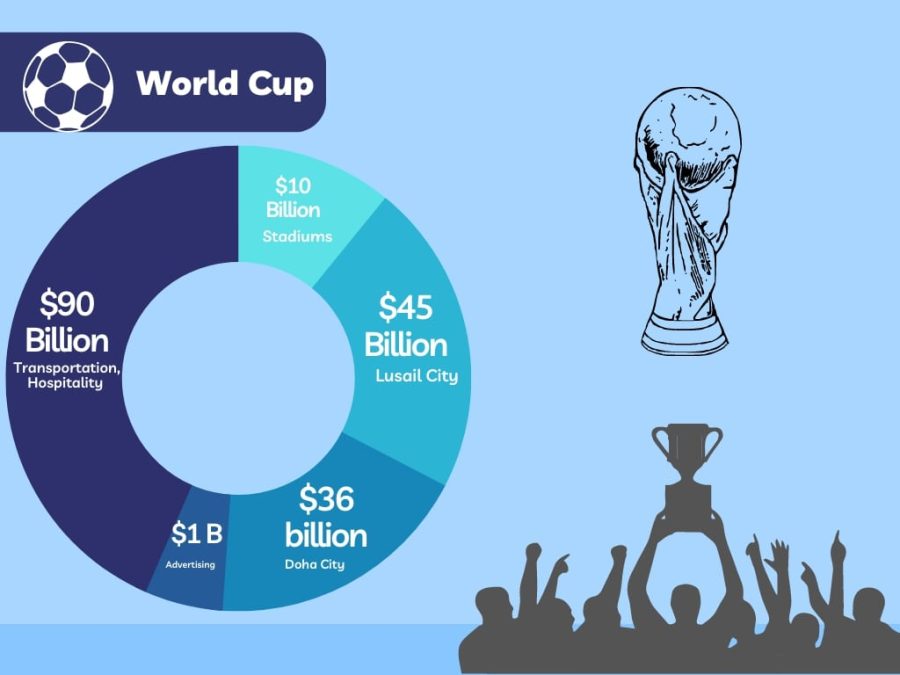Hosting a $300 billion World Cup: Where did Qatar spend its money?
Qatar spent their costly budget in five main areas.
December 16, 2022
In 2010 it was revealed that Qatar, a small country in Asia with a population of 2.9 million would be hosting the biggest soccer event in the world. Given 12 years to prepare, Qatar went to work, transforming the country into a prime destination for the World Cup.
“Not only would this show the world that the Middle East is more than a turbulent and dangerous backwater. It would also bring the outside world to the fabled Middle East street,” said the chairman of the bid committee Sheikh Mohammed bin Hamad bin Khalifa Al-Thani Bin, while pitching Qatar as the host of the World Cup
This comes at a cost as Qatar has spent the most money on hosting a World Cup, spending well over $200 billion, costing more than all the past World Cups combined. With a GDP of $180 billion, putting this much into an event is a huge risk for its economic well-being.
“If the cost is truly $200 billion, that seems to be way out of line as a cost to host. What the World Cup will surely do is increase the amount of money local businesses will make,” said Economics teacher Bee Benson.
For the 2022 World Cup, Qatar built and renovated eight stadiums to be played in as well as building roads and hotels for visitors, estimating around $10 billion in stadiums alone. In the years leading up to the World Cup, Qatar’s Minister of Finance claimed that the country was spending $500 million a week in preparation for the event.
“This is a landmark for the northern areas of Qatar. There was nothing here before, just desert,” said project manager Majid al-Bader.
Qatar is a country that cares deeply about art and beauty, reportedly spending $1 billion annually on art. This event is a chance for Qatar to show off its beauty to the world. They wanted themselves and their history to be seen.
“Qatar has always been much more connected, if you will, to that sense of their past and their historical memory. There’s this global stage on which they want to present themselves,” said Yale Professor Kishwar Rizvi.
In 2010 when Qatar was announced to be hosting the World Cup, FIFA faced a lot of backlash for their decision for various reasons. Even former FIFA president Sepp Blatter spoke out about his regret in picking Qatar to host the World Cup.
“It was a bad choice. And I was responsible for that as president at the time…It’s a country that’s too small, Football and the World Cup are too big for that,” said Blatter.
Housing has been an issue for this event as James Dator and SB NATION reported that 30,000 rooms have been set up in shipping containers for fans to stay during the World Cup for $203 a night.
“I don’t think the size necessarily matters too much, as long as they can accommodate the amount of fans, players, and the stadiums they need because the big issue is that they don’t have enough stores, they don’t have enough housing for people or places for them to stay. So I don’t think the country’s size matters, just the size of the accommodations,” said Andrew McMasters (23’), AV Varsity Boys Soccer Captain.
BBC spoke with a longtime England soccer fan Paul Clegg about his plans to attend the event this year in Qatar and his concerns about accommodation.
“I’ve just booked a room for the first four nights and I am paying a lot for it. I haven’t found any reasonably priced options, so I am not sure where I will be staying after that,” said Clegg.
Qatar has attempted to fix these issues with different options for fans including two cruise ships that have been transformed into hotels and offering rooms in apartments, villas, and tents. Still, it has not been enough for the 1.2 million fans in attendance.




